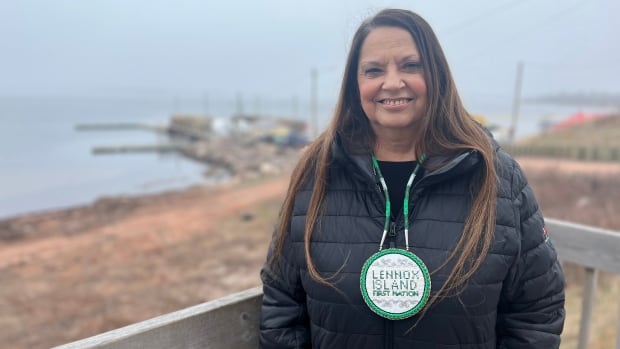The chief of Lennox Island First Nation says it will fish 1,000 traps in the spring lobster fishery off P.E.I.’s North Shore this year as part of its treaty-protected fishery — whether or not the Department of Fisheries and Oceans approves.
The First Nation was planning to do the same last year, but ended up reaching an understanding with DFO to fish no more than the 300 traps the federal government could authorize in the spring, and later fish another 700 off the South Shore as part of the fall lobster fishery.
Chief Darlene Bernard said she’s always been clear about her community’s intention to fish all 1,000 traps out of their own wharf on Lennox Island in the spring of 2023, and now they’ll be following through.
“Our plans are exactly what we said they would be last year,” Bernard told CBC News in Lennox Island on Monday.
“We have 10 people, 10 young families, young fishers who are excited to be getting started. I signed their designation forms with the band government this morning and they’ll be ready to get going. And I think everybody’s really, extremely excited about it.”
Bernard said whether or not the Canadian government “approves” of her nation’s fishery in Lobster Fishing Area 24 (LFA 24) is not her concern.
“What the DFO needs to do on their side to appease whoever they need to appease… We don’t need DFO’s traps or tags and we don’t need their permission,” she said.
“I’d like to have an understanding with them… All we’re trying to do here is to practise our rights.”
‘The constraint’
Both DFO and the federal minister responsible for it, Joyce Murray, acknowledge the Mi’kmaw right to fish for a moderate livelihood — first cemented in treaties in the 1700s and affirmed and later clarified by the Supreme Court of Canada.
But the federal department has been trying to implement moderate livelihood (or treaty-protected) fisheries by buying up commercial licences in various regions and redistributing them to First Nations, so that the same amount of lobster ends up coming out of Atlantic waters.
Banking licences that people have been putting on the market… that depends on there being willing sellers at a market price. That is sometimes the constraint.— Federal Fisheries Minister Joyce Murray
When asked if DFO had been able to buy additional licences to support Lennox Island’s plans to fish 1,000 traps in LFA 24 in 2023, the minister said: “We’re working on that.”
Murray told CBC News in an April 14 interview: “Banking licences that people have been putting on the market… that depends on there being willing sellers at a market price.

“That is sometimes the constraint and DFO, our [regional director general] and his team, do their utmost to find that capacity that each [First] Nation is looking for — and sometimes it takes a little bit of time.”
‘My position hasn’t changed’
Bernard said she has informed the regional director of Lennox Island’s plans.
“They knew exactly where I was coming from last year and my position hasn’t changed and it’s not going to change… If you want to protect rights, you have to practise them. You can’t shelve them,” she said.
“I hope that everyone will respect our right to a treaty-protected fishery and be open-minded about what we’re trying to do here.”

Some First Nations in the Maritimes have opted to strike deals and sign Rights Reconciliation Agreements with the federal government in pursuit of greater autonomy in their fisheries. For example, Abegweit First Nation announced its Collaborative Fisheries Management Agreement alongside Murray and DFO officials earlier this month in Scotchfort, P.E.I.
Bernard said she did not have her community’s blessing to go that route.
“If I signed the agreement, we would get money, but we wouldn’t be able to launch those 10 boats for those thousand traps for our young people and my community.
We’re not going to sign any agreements unless they are respectful of rights.— Lennox Island Chief Darlene Bernard
“I’ve had numerous, numerous engagements with [my community] over that last year,” she said. “We’re not going to sign any agreements unless they are respectful of rights.”
Some employees of DFO are now taking part in the Public Service Alliance of Canada strike, but in an April 14 email to CBC News, officials said: “Lennox Island First Nation expressed their intent to carry out a treaty-protected fishery again this year. DFO continues working with the First Nation on implementing this request.”
Lennox Island again plans for its treaty fishery to be contained within the dates of the commercial season, which is scheduled to open on Saturday in LFA 24.


